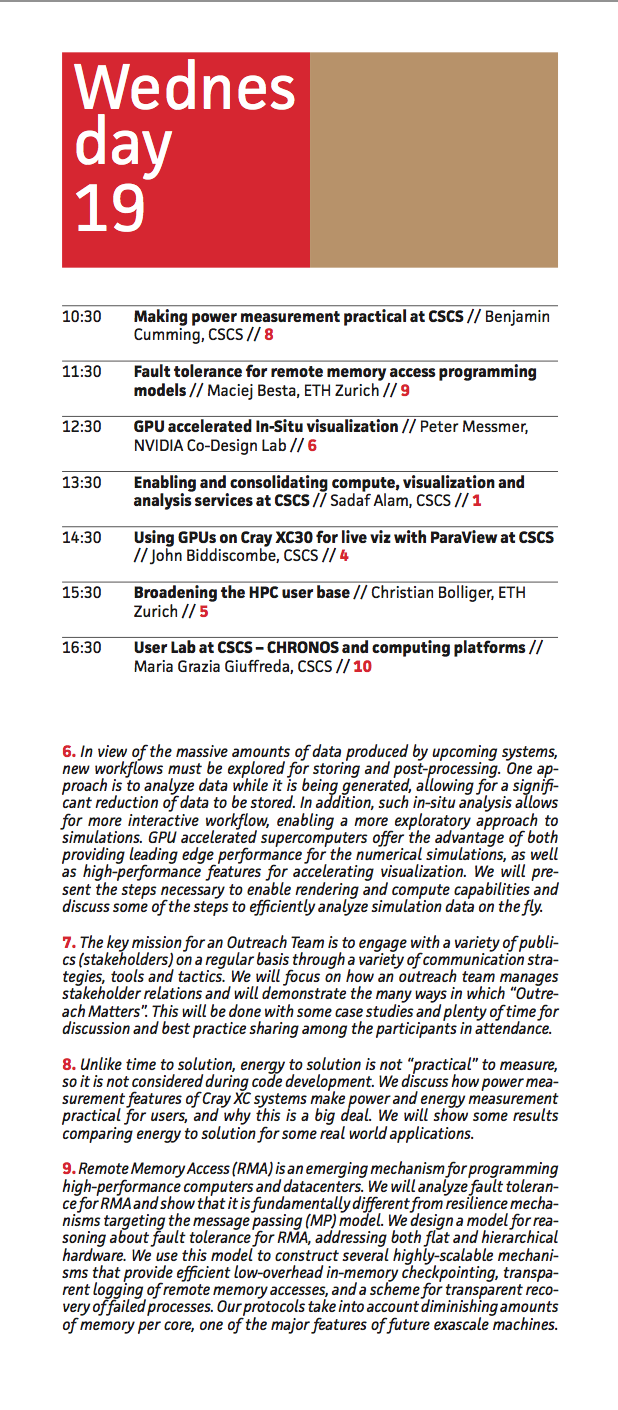Talks at booth 3756 on Wednesday 19.11.2014
The Swiss HPC community hpc-ch and CSCS invite you to visit the “Swiss House of HPC” at SC14 in New Orleans at booth 3756, where you can meet Swiss HPC specialists and scientists, and get the latest news about HPC and science in Switzerland, together with some Swiss coffee and chocolate.
Among the novelties, every hour you will have the opportunity to follow a talk that show the excellence of Switzerland in HPC and world-class research. By participating at one of the numerous talks you will receive a nice and original gift!
On Wednesday 19.11.2014 we will have the following talks:
10:30 Making power measurement practical at CSCS // Benjamin Cumming, CSCS // Unlike time to solution, energy to solution is not “practical” to measure, so it is not considered during code development. We discuss how power measurement features of Cray XC systems make power and energy measurement practical for users, and why this is a big deal. We will show some results comparing energy to solution for some real world applications.
11:30 Fault tolerance for remote memory access programming models // Maciej Besta, ETH Zurich // // Remote Memory Access (RMA) is an emerging mechanism for programming high-performance computers and datacenters. We will analyze fault tolerance for RMA and show that it is fundamentally different from resilience mechanisms targeting the message passing (MP) model. We design a model for reasoning about fault tolerance for RMA, addressing both flat and hierarchical hardware. We use this model to construct several highly-scalable mechanisms that provide efficient low-overhead in-memory checkpointing, transparent logging of remote memory accesses, and a scheme for transparent recovery of failed processes. Our protocols take into account diminishing amounts of memory per core, one of the major features of future exascale machines.
12:30 GPU accelerated In-Situ visualization // Peter Messmer, NVIDIA Co-Design Lab // In view of the massive amounts of data produced by upcoming systems, new workflows must be explored for storing and post-processing. One approach is to analyze data while it is being generated, allowing for a significant reduction of data to be stored. In addition, such in-situ analysis allows for more interactive workflow, enabling a more exploratory approach to simulations. GPU accelerated supercomputers offer the advantage of both providing leading edge performance for the numerical simulations, as well as high-performance features for accelerating visualization. We will present the steps necessary to enable rendering and compute capabilities and discuss some of the steps to efficiently analyze simulation data on the fly.
13:30 Enabling and consolidating compute, visualization and analysis services at CSCS // Sadaf Alam, CSCS // An overview of CSCS flagship and other computing resources are provided that provision multiple services including compute, visualization, data analytics for the User Lab, and for customers including weather forecast for MeteoSwiss on diverse platforms. We share details on consolidation of multiple services on our flagship systems, specifically compute and visualization on the Nvidia K20x devices, which has been showcased at SC14.
14:30 Using GPUs on Cray XC30 for live viz with ParaView at CSCS // John Biddiscombe, CSCS // We will show a ParaView demo of Bonsai running on Cray XC30 “Piz Daint” at CSCS. A galaxy simulation is rendered live on the GPUs of “Piz Daint” using the splotch renderer giving photorealistic images.
15:30 Broadening the HPC user base // Christian Bolliger, ETH Zurich // ETH Zurich is providing (high-performance) compute power to its scientists since 1950. However only a limited number of research fields could make use of HPC. We started to broaden the potential user base using virtualization and offering consulting.
16:30 User Lab at CSCS – CHRONOS and computing platforms // Maria Grazia Giuffreda// CSCS // The Swiss National Supercomputing Centre is run as User Lab and promotes and encourages top-notch research. Consequently, CSCS operates cutting-edge computer systems as an essential service facility for Swiss researchers. These computers aid scientists with diverse issues and requirements. This talk tries to give an overview of the services offered at CSCS, the allocation schemes, as well as who can apply, how and when.
To learn more please visit the website: www.hpc-ch.org and follow us @hpcch on Twitter.


